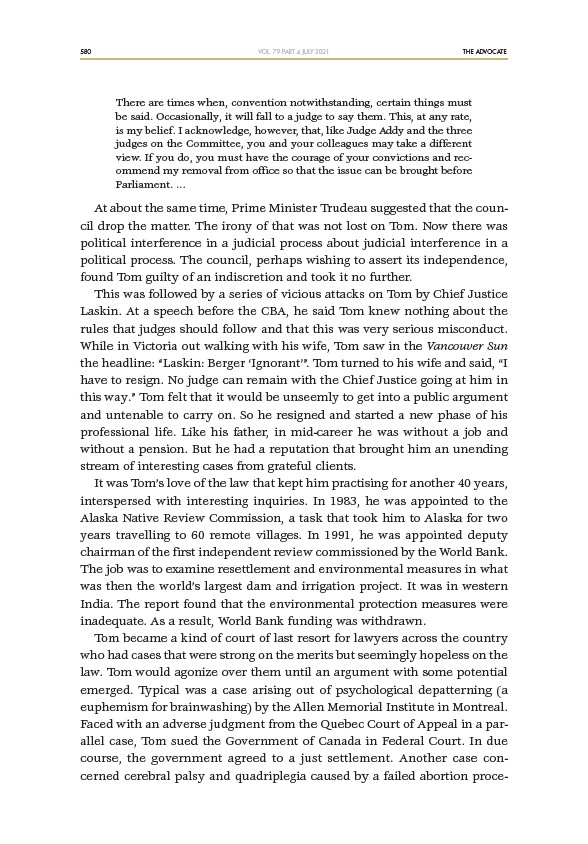
580 THE ADVOCATE
VOL. 79 PART 4 JULY 2021
There are times when, convention notwithstanding, certain things must
be said. Occasionally, it will fall to a judge to say them. This, at any rate,
is my belief. I acknowledge, however, that, like Judge Addy and the three
judges on the Committee, you and your colleagues may take a different
view. If you do, you must have the courage of your convictions and recommend
my removal from office so that the issue can be brought before
Parliament. …
At about the same time, Prime Minister Trudeau suggested that the council
drop the matter. The irony of that was not lost on Tom. Now there was
political interference in a judicial process about judicial interference in a
political process. The council, perhaps wishing to assert its independence,
found Tom guilty of an indiscretion and took it no further.
This was followed by a series of vicious attacks on Tom by Chief Justice
Laskin. At a speech before the CBA, he said Tom knew nothing about the
rules that judges should follow and that this was very serious misconduct.
While in Victoria out walking with his wife, Tom saw in the Vancouver Sun
the headline: “Laskin: Berger ‘Ignorant’”. Tom turned to his wife and said, “I
have to resign. No judge can remain with the Chief Justice going at him in
this way.” Tom felt that it would be unseemly to get into a public argument
and untenable to carry on. So he resigned and started a new phase of his
professional life. Like his father, in mid-career he was without a job and
without a pension. But he had a reputation that brought him an unending
stream of interesting cases from grateful clients.
It was Tom’s love of the law that kept him practising for another 40 years,
interspersed with interesting inquiries. In 1983, he was appointed to the
Alaska Native Review Commission, a task that took him to Alaska for two
years travelling to 60 remote villages. In 1991, he was appointed deputy
chairman of the first independent review commissioned by the World Bank.
The job was to examine resettlement and environmental measures in what
was then the world’s largest dam and irrigation project. It was in western
India. The report found that the environmental protection measures were
inadequate. As a result, World Bank funding was withdrawn.
Tom became a kind of court of last resort for lawyers across the country
who had cases that were strong on the merits but seemingly hopeless on the
law. Tom would agonize over them until an argument with some potential
emerged. Typical was a case arising out of psychological depatterning (a
euphemism for brainwashing) by the Allen Memorial Institute in Montreal.
Faced with an adverse judgment from the Quebec Court of Appeal in a parallel
case, Tom sued the Government of Canada in Federal Court. In due
course, the government agreed to a just settlement. Another case concerned
cerebral palsy and quadriplegia caused by a failed abortion proce-